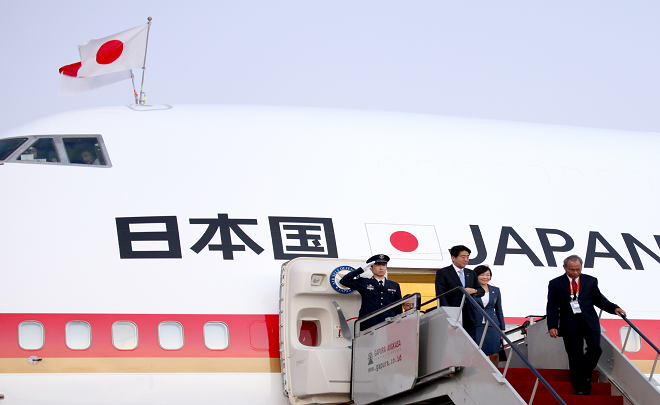Can Japan and its Neighbors Move Beyond the History Trap?

Former Swedish Ambassador to Japan Lars Vargö argues that unconstructive focus on Japan’s militarist past blinds the urgent realities of needing to deal with the present.
More than seventy years after the end of World War Two, Japan’s actions are still viewed by its neighbors through the lens of history. In particular, its reinterpretation of article 9 of the constitution last year has invoked the spectre of Japan’s re-militarization. While legitimate historical grievances remain and need to be dealt with, Japan’s gradual path to normalcy should pave the way for cooperation guided by present realities rather than past facts.
Path to Normalcy
Japan’s reinterpretation of the constitution, which the Liberal Democratic Party (LDP)-controlled Parliament adopted in 2015, throws into question the issue of Japan’s “right” to be a normal country able to defend its territory as well as participate in military operations overseas.
Ever since the constitution was enacted in 1947, there have been voices in Japan arguing that its very core is unfair. Regardless of Japan’s actions in the first half of the twentieth century, they questioned why Japan should be the only country in the world forced to accept an article which forbade it to have a military capability to defend itself. Others, notably the Japanese Socialist Party (JSP) as the main opposition force, long resisted any moves to revise the constitution.
While the Korean War 1950-53 quickly presented the reality which made it necessary to reinterpret the constitution to maintain some kind of defense force, it was not until 1994 that the JSP under Prime Minister Murayama Tomiichi finally dropped its opposition and officially recognized Japan’s “Self-Defense Forces.”
The post-war changes have continued to be gradual. It was for a long time a taboo to talk about an “alliance” with the United States. Now it is recognized as a simple fact. It also took many years until the Defense Agency could call itself a “Ministry” and its cabinet member in charge a “Minister of Defense.” Again this is no longer in question.
The 2015 changes represents the most significant step forward. The revision of article 9 allows for “collective self-defense” – whereby Japan could defend its allies if under attack in a situation that threatens its survival – and to a certain extent arms exports. But, at the same time, it has been met with significant consternation by Japan’s neighbors.
Debunking Militarism
All arguments about Japan’s military capability are undoubtedly related to history. The war created unimaginable suffering and destruction at the hands of Japanese troops, but Japan itself was also more or less completely destroyed before it capitulated in August 1945. In spite of the fact that Japan has been a peaceful democracy ever since, it is today sometimes accused of not having learned the lessons of history and for not showing enough sensitivity towards its former victims. Visits to the Yasukuni Shrine by Japanese government representatives are taken as a sign of them wishing to whitewash and rewrite history. Furthermore, critics of the recent constitutional reinterpretation point at the dangers of militarism again growing in Japan.
Certainly, there are those in Japan who do not understand, or wish to understand, the scope of what was done during the war, and this is especially serious if it involves prominent politicians, but if one wants to accuse Japan of wishing to re-awaken the military ghost of the past, one also has to take into consideration whether an ideology that wishes to expand the Japanese “empire” in the region exists or not. Militarism is aggressive by its very nature, but it is obvious that Japan does not harbour intentions to reconquer the Korean Peninsula, invade China, or establish another puppet regime in Manchuria.
Focus on Current Realities
Denying historical facts is serious and dangerous, especially for nationalistic reasons, and it is clear that efforts need to be geared towards understanding and atonement. In this regard, the recent bilateral agreement between Japan and the Republic of Korea on the sex slave issue is a very positive step towards true reconciliation between those two countries.
However, it is also necessary to leave the post-war concept behind and focus on the ambitions of the states and politicians of today. Even if it is true that the territorial issues in Northeast Asia have their origins in earlier wars, it is not necessarily constructive to have those wars as the dominant basis for discussions on the future. It is the present and future realities that ought to be the main departure point for necessary actions towards regional stability.
While consigning history to history is necessary, this is easier said than done. There are still too many incidents of the past that rankle and which are perceived as unfair by all sides. Yet, by seeking to bring those discussions into wider negotiations on building a stable security cooperation structure in Northeast Asia, all states can seek to move beyond the “trap of history.”